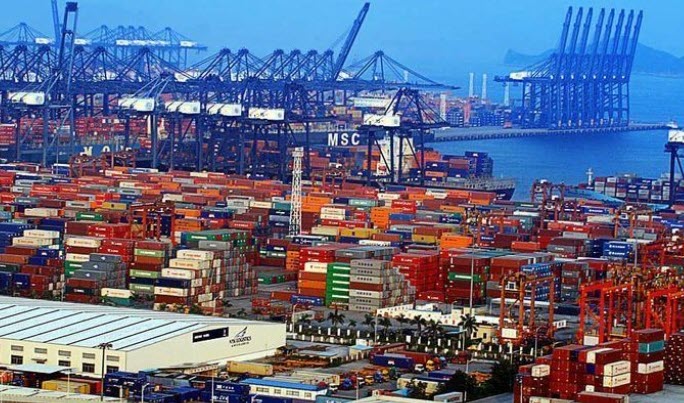
Dr Sian Prior, lead advisor to the Clean Arctic Alliance, reacts to recent news headlines that cutting shipping pollution contributes to a more extreme global temperature rise. She provides scientific context for these reports, and argues that more regulation of shipping is needed to combat the industry’s climate impacts.
News of a study made recent climate headlines stating that cutting pollution from global shipping accelerates heating of our planet and oceans.
The study concludes that UN air pollution rules introduced in 2020 aimed at cutting sulphur content in shipping fuels caused an “inadvertent geoengineering termination shock”, with significant global warming impacts.
Many leading scientists have since reacted that there’s more to this story than is apparent at first glance. They argue that the extreme ocean temperatures recorded over the past year cannot be solely blamed on shipping’s sulphur reductions, and that there likely is a whole range of factors contributing to this effect.
The real risk to our oceans comes from climate inaction, and, if anything, we urgently need governments to do more to address shipping’s huge environmental and climate pollution.
The crucial negotiations happening at the UN’s International Maritime Organization (IMO) this and next year are our earliest chance to make this happen.
Dangerous shipping pollutants and their risks
Sulphur oxide (SOx) refers to a range of sulphur and oxygen-based pollutants that are produced by burning fossil fuels such as coal or in shipping’s case, heavy fuel oil.
Exposure to SOx can cause serious illnesses such as asthma and bronchitis, and has been linked to thousands of respiratory-related deaths each year. Other effects of SOx include acid rains that cause significant damage to ecosystems.
It’s not a surprise that many countries, as well as the UN in case of shipping, have taken action to restrict SOx emissions, in order to benefit from the improved air quality and reduced public health burden.
At the same time, SOx is one of the building blocks of atmospheric particles called aerosols, which are associated with both cooling and heating effects on our planet. SOx-based aerosols cool our planet, thanks to their ability to reflect solar radiation and help to form clouds that provide further cover.
Other types of aerosols have the opposite effect.
Black carbon is emitted alongside SOx when burning fossil fuels. When it reaches snow and icy environments, such as the Arctic or mountain glaciers, it has a “double-whammy” warming impact, by speeding up the ice melting and revealing dark surfaces of land that absorb further solar radiation.
With all this science in mind, the IMO–shipping’s climate regulator–decided to gradually restrict sulphur in marine fuels, in order to reach 0.5% in 2020.
This was the right decision, benefiting countries and communities most impacted by the health and environmental effects of SOx. One study estimates that if this action was delayed until 2025, it would contribute to more than 570,000 additional premature deaths globally.
But back in 2020, the IMO also hoped that addressing SOx emissions would lead to a parallel reduction in black carbon, by moving ships onto cleaner distillate fuels. In reality however, ships merely shifted onto low-sulphur fuels that reduce SOx emissions but do not reduce black carbon.
The IMO’s failure to address other dangerous pollutants like black carbon puts a dent in its SOx reduction success story.
Reducing pollution must not become a trade-off between human health and climate, and instead of trying to find a single cause for climate change, it is important to remember that the current crisis does not have a single source. Even if reducing SOx shipping pollution removes an artificial cooling impact, it’s just one piece of the puzzle.
Way forward
Addressing the climate crisis requires not backing down from useful, life-saving measures, but in fact the opposite: stepping up efforts to cut all pollutants, like carbon, black carbon, and methane–all of which are as closely linked to shipping as SOx.
Only this way can we counter the loss of cooling as a result of reducing polluting SOx emissions.
This and next year, the IMO is revising its existing climate rules, and deciding on new and additional policies to deliver its historic commitment to make shipping zero-emissions by 2050.
Meeting these goals will require stepping up ambition in the current energy efficiency standards for ships, including through improved operational efficiency and reduced fuel burn. On top of this, the IMO needs to urgently introduce regulations for the use of cleaner fuels in and near the Arctic to adequately address the heating impacts of black carbon.
The IMO already agreed to adopt in April 2025 some form of emissions price (e.g. a levy)–which would be the world’s first universal emissions price on any international industry–and strong incentives for the uptake of zero-emission fuels.
Only with an ambitious approach across these policies, including a levy of at least $150 a tonne of greenhouse gas emissions as proposed by the Pacific Island states and Belize, can shipping be held accountable for its damages. Justice and fairness are especially important to these discussions, as the IMO must ensure vulnerable states that suffer the gravest climate impacts are appropriately assisted.
With the next round of IMO talks set for autumn in London, governments must not get distracted by sensational headlines implying that pollution is a climate solution.
Instead, they must show up to the IMO with a single purpose: to ramp up action on shipping to reverse the overheating of our planet and build a future in which all can flourish.
Take the Survey at https://survey.energynewsbeat.com/
Crude Oil, LNG, Jet Fuel price quote
ENB Top News
ENB
Energy Dashboard
ENB Podcast
ENB Substack






